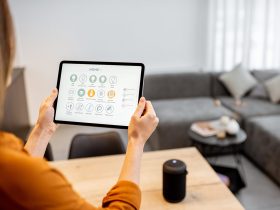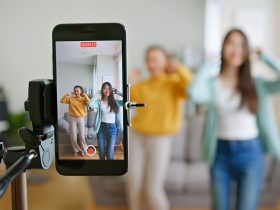It knows the sound of your voice, the contours of your face, where you are and where you’ve been…it’s your smart phone. Creepy? Yes, but we’ll wager you can’t imagine life without it! Once, our mobiles were just phones. Then they became sophisticated mini- computers that functioned as our constant companions and a vital anchor to our “always-on” modern world. Now they’re an extension of us, logging our private conversations, photos, passwords, financial details, and more. Your phone is your entire identity, and it’s high time to keep the shutters down on this electronic window to your soul.
Most of us are giving our phone and the apps within it more information than we realize. How are you being relentlessly tracked and what are the top current threats to your mobile security? Knowledge is power so read on to regain control.
Location (or should we call it human?) tracking
If you own a mobile phone, your movements and location are logged every minute and stored in gigantic data files. See the Times Privacy Project for details of one such file. It holds more than 50 billion location pings from the phones of over 12 million Americans! Who spent the night at the Playboy Mansion? Who’s visiting the White House? Your phone is naturally indiscreet, and its sensors, including the compass, GPS, and gyroscope (which shows where your phone is in 3D space) hand info over. Many phones can even accept signals from services like Russia’s GLONASS. Remember: It’s legal for companies—even unvetted and unregulated ones—to collect and sell your data. Would you allow your government to do that?
Top tips:
- Disable location sharing for apps already on your phone. See here for iOS devices and here for Android.
- Stop Google from storing your location by going to your account’s location activity controls and turning off location sharing.
- Use a VPN (virtual private network) like Avira Free Mobile Security to encrypt your online communications and disguise your real location.
- Disable your advertising ID tracker to conceal your activities from advertisers and others with Avira Antivirus Security for Android.
Risky apps and mobile data leaks
Much like lunches, there is no such thing as a totally free mobile app. So-called riskware apps are often found in official app stores and perform as promised—but users can pay a high price when the app mines personal (and even corporate) data and sends it to a remote server. Here it can be accessed by advertisers and even cyber criminals.
To make matters worse, did you know that many mobile app developers simply aren’t aware of secure coding techniques and can unwittingly create vulnerabilities? Mobile apps are built primarily for slick performance and loads of features, which can come at the expense of mobile security. If you’re still curious as to why they get hacked, see more detailed answers by Avira Protection Labs here.
Don’t grant apps broad permissions but only let them access what they need to function. Avoid any apps that ask for more data than necessary.
Do use a password manager like Avira Password Manager Pro. In addition to protecting your accounts with strong passwords, it warns you if your data has been stolen after a breach.
Do choose complete protection that includes Identity Safeguard, like Avira security for iOS and Android. It checks whether your email has been compromised in a security breach and raises the alarm.
Unsecured Wi-Fi
It’s tempting to tap into a wireless hotspot when you’re out, but never use it to access confidential services. A cybercriminal can exploit the security flaws in public networks to monitor your activity, log your card details if you’re shopping online, and even gain access to everything on your device! Always use a VPN to connect to public Wi-Fi securely and privately.
No, Siri!
Imagine you’re having a confidential chat with your doctor. If Siri is unintentionally activated, a recording of the conversation (along with accompanying data such as your location) can be sent to Apple and its contractors for analysis and quality control. And if you’re thinking that a Siri mishap won’t happen to you, remember that even a zip being opened has been interpreted as “hey Siri!”. Fortunately, Privacy Manager, part of Avira Free Mobile Security for iOS, prevents your data being sent.
Gone phishing
Did you know that mobile devices are the most popular targets for phishing attacks on your personal data? Mobile users are more vulnerable for many reasons: They’re often more rushed and quickly checking their emails in real time. Plus, email apps display less information, so it’s more difficult to see critical information like the sender’s name.
The holy grail of anti-phishing: Never click on unknown links or open attachments. Double check the sender at your desk, and always use a trusted antivirus to protect you from all types of malware. Thankfully, Avira’s security for Android and iOS comes with Web Protection (Pro only), which blocks infected and phishing sites before they load.
Keeping prying eyes out of your apps
It seems harmless to lend your phone to someone to make a call or to show them that hilarious video of goats dancing on YouTube. Yet as soon as your back is turned, they could access other info on your phone… or not. With Avira AppLock for Android it’s so easy to create a PIN for each app and use it to lock down whatever applications you want to secure, from Skype calls to WhatsApp chats. Select Geo Lock to lock apps only when you are in a certain place, like the office.
The more dependent we become on mobiles, the more attractive they will continue to be for cybercriminals, advertisers, and trackers.














